TimTaiLieu.vn - Tài liệu, ebook, giáo trình, đồ án, luận văn
Tổng hợp tất cả tài liệu, ebook, giáo trình Sinh Học chọn lọc và hay nhất.

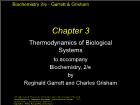 Bài giảng Biochemistry 2/e - Chapter 3: Thermodynamics of Biological Systems
Bài giảng Biochemistry 2/e - Chapter 3: Thermodynamics of Biological SystemsOutline Basic Thermodynamic Concepts Physical Significance of Thermodynamic Properties pH and the Standard State The Effect of Concentration Coupled Processes High-Energy Biomolecules
 33 trang | Chia sẻ: nguyenlinh90 | Ngày: 23/07/2019 | Lượt xem: 877 | Lượt tải: 0
33 trang | Chia sẻ: nguyenlinh90 | Ngày: 23/07/2019 | Lượt xem: 877 | Lượt tải: 0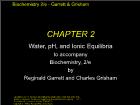 Bài giảng Biochemistry 2/e - Chapter 2: Water, pH, and Ionic Equilibria to accompany Biochemistry, 2/e
Bài giảng Biochemistry 2/e - Chapter 2: Water, pH, and Ionic Equilibria to accompany Biochemistry, 2/eOutline 2.1 Properties of Water 2.2 pH 2.3 Buffers 2.4 Water's Unique Role in the Fitness of the Environment
 32 trang | Chia sẻ: nguyenlinh90 | Ngày: 23/07/2019 | Lượt xem: 952 | Lượt tải: 0
32 trang | Chia sẻ: nguyenlinh90 | Ngày: 23/07/2019 | Lượt xem: 952 | Lượt tải: 0 Bài giảng Biochemistry 2/e - Chapter 1: Chemistry is the Logic of Biological Phenomena to accompany Biochemistry, 2/e
Bài giảng Biochemistry 2/e - Chapter 1: Chemistry is the Logic of Biological Phenomena to accompany Biochemistry, 2/eOutline 1.1 Distinctive Properties of Living Systems 1.2 Biomolecules: Molecules of Life 1.3 Biomolecular Hierarchy 1.4 Properties of Biomolecules 1.5 Organization and Structure of Cells 1.6 Viruses as Cell Parasites
 32 trang | Chia sẻ: nguyenlinh90 | Ngày: 23/07/2019 | Lượt xem: 976 | Lượt tải: 0
32 trang | Chia sẻ: nguyenlinh90 | Ngày: 23/07/2019 | Lượt xem: 976 | Lượt tải: 0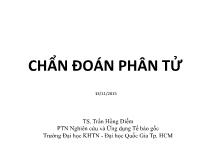 Chẩn đoán phân tử
Chẩn đoán phân tửNội dung • Chẩnđoán là gì ?! • Phân biệt chẩnđoán và tiên lượng! • Chẩnđoán phân tử! • Phương pháp dùng trong chẩnđoán phân tử! A. Phương pháp chẩnđoán miễn dịch! B. Phương pháp chẩnđoán sử dụng nucleic acid
 47 trang | Chia sẻ: nguyenlinh90 | Ngày: 23/07/2019 | Lượt xem: 1543 | Lượt tải: 0
47 trang | Chia sẻ: nguyenlinh90 | Ngày: 23/07/2019 | Lượt xem: 1543 | Lượt tải: 0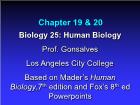 Bài giảng Biology 25: Human Biology - Chapter 19 & 20
Bài giảng Biology 25: Human Biology - Chapter 19 & 20Heredity: The transmission of traits from one generation to another. Variation: Offspring are different from their parents and siblings. Genetics: The scientific study of heredity and hereditary variation. Involves study of cells, individuals, their offspring, and populations.
 89 trang | Chia sẻ: nguyenlinh90 | Ngày: 23/07/2019 | Lượt xem: 1098 | Lượt tải: 0
89 trang | Chia sẻ: nguyenlinh90 | Ngày: 23/07/2019 | Lượt xem: 1098 | Lượt tải: 0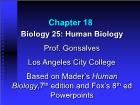 Bài giảng Biology 25: Human Biology - Chapter 18
Bài giảng Biology 25: Human Biology - Chapter 18Fertilization Ejaculation 300 million sperm, 100 reach (uterine) fallopian tube. Fertilization occurs in the uterine tubes Acrosomal reaction: Acrosome of sperm contains hyaluronidase, an enzyme that digests a channel through zona pellucida. Sperm fuses with ovum cell membrane.
 47 trang | Chia sẻ: nguyenlinh90 | Ngày: 23/07/2019 | Lượt xem: 970 | Lượt tải: 0
47 trang | Chia sẻ: nguyenlinh90 | Ngày: 23/07/2019 | Lượt xem: 970 | Lượt tải: 0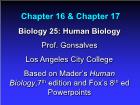 Bài giảng Biology 25: Human Biology - Chapter 16 & 17
Bài giảng Biology 25: Human Biology - Chapter 16 & 17Sexual Reproduction Sexual Reproduction: Only organ system that is not essential for individual survival. Continuation of species. Gamete formation (eggs and sperm) cells. Homeostatic Role: Maintains secondary sexual characteristics.
 104 trang | Chia sẻ: nguyenlinh90 | Ngày: 23/07/2019 | Lượt xem: 1162 | Lượt tải: 0
104 trang | Chia sẻ: nguyenlinh90 | Ngày: 23/07/2019 | Lượt xem: 1162 | Lượt tải: 0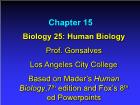 Bài giảng Biology 25: Human Biology - Chapter 15
Bài giảng Biology 25: Human Biology - Chapter 15Hormones Regulatory molecules secreted into the blood or lymph by endocrine glands. Lack ducts. Carry hormone to target tissue where it produces its effects.
 81 trang | Chia sẻ: nguyenlinh90 | Ngày: 23/07/2019 | Lượt xem: 1188 | Lượt tải: 0
81 trang | Chia sẻ: nguyenlinh90 | Ngày: 23/07/2019 | Lượt xem: 1188 | Lượt tải: 0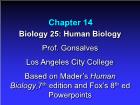 Bài giảng Biology 25: Human Biology - Chapter 14
Bài giảng Biology 25: Human Biology - Chapter 14Sensory Receptors Perceptions of world are created by the brain from AP sent from sensory receptors. Sensory receptors respond to a particular modality of environmental stimulus. Receptors transduce (change) different forms of sensation to nerve impulses.
 67 trang | Chia sẻ: nguyenlinh90 | Ngày: 23/07/2019 | Lượt xem: 1086 | Lượt tải: 0
67 trang | Chia sẻ: nguyenlinh90 | Ngày: 23/07/2019 | Lượt xem: 1086 | Lượt tải: 0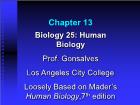 Bài giảng Biology 25: Human Biology - Chapter 13
Bài giảng Biology 25: Human Biology - Chapter 13Functions of Nervous Tissue 1. Sensory Input: Conduction of signals from sensory organs (eyes, ears, nose, skin, etc.) to information processing centers (brain and spinal cord). 2. Integration: Interpretation of sensory signals and development of a response. Occurs in brain and spinal cord. 3. Motor Output: Conduction of signals from brain or sp...
 93 trang | Chia sẻ: nguyenlinh90 | Ngày: 23/07/2019 | Lượt xem: 934 | Lượt tải: 0
93 trang | Chia sẻ: nguyenlinh90 | Ngày: 23/07/2019 | Lượt xem: 934 | Lượt tải: 0
Website đang trong thời gian thử nghiệm, chờ xin giấy phép của Bộ TT & TT.

